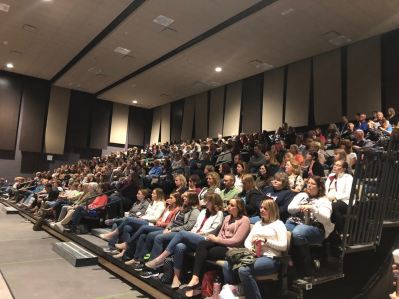Schoharie Valley Area Schools and the BOCES Partnership
A coalition of small, rural school districts collaborates in standards implementation with support of BOCES Partnership
For small rural schools in New York’s Capital Region, implementing new learning standards presents a big challenge. Rather than face this formidable task in isolation, a group of school leaders in the rural Schoharie Valley area have banded together to collaboratively approach implementation of the New York State Next Generation Learning Standards in each of their districts: Berne-Knox-Westerlo, Cobleskill-Richmondville, Duanesburg, Middleburgh, Schoharie, and Sharon Springs.
The six district leaders agreed early on to seek the support of the Capital Region BOCES to ensure fidelity to the process of developing standards-based curriculum, an essential step in the rollout of the state’s new Next Generation English Language Arts (ELA) and Mathematics Learning Standards.
“We want to come out of this with new curriculum that matches the standards in ELA and math to start and in all content areas at the end,” said Superintendent David Blanchard, Schoharie Central School District. “Through this collaborative approach, our goal is to have teachers develop teaching points and curriculum units to match each standard. Our sense was that if we worked together through BOCES, this work would get done correctly.” This collaboration between districts and BOCES has become a model for other districts across the state to follow when preparing to implement the new learning standards.
The work that Blanchard’s staff along with neighboring districts’ staff continue to do collectively with Capital Region BOCES as part of the larger BOCES Partnership has become a model for other districts across the state to follow when preparing to implement the new learning standards.
“The idea of jumping in with both feet this year and really engaging in standards work, we were leading our region, and as individual districts – small, rural school districts – it’s very difficult for a small rural school district to lead the Capital Region, per se; but we can do it as a group,” Blanchard added.
The BOCES Partnership
As its name suggests, the BOCES Partnership is a collaborative network and is currently comprised of 15 BOCES and the Syracuse City School District. The district superintendents from Capital Region BOCES and Monroe 1 BOCES spearheaded the Partnership to harness the collective knowledge, skills, and experiences of educators at all levels of the state’s public education system.
Its priority is to create and provide access to rigorous and standards-aligned curriculum and professional development for teachers and school leaders to implement the Next Generation ELA and math standards.
The Partnership’s model maximizes the efficient distribution of high-quality tools, resources, expertise, and effective practice in support of the rollout of the Next Generation Standards. This collaborative work is essential in ensuring equitable access to high-quality teaching and learning to all students regardless of their zip code.
Regional professional development guided by the three principles: teacher-centered, teacher-led, and shared experiences for all teachers
Blanchard and his fellow school chiefs decided for the 2018-19 school year to organize and participate in shared regional professional development days during which teachers and administrators from each district would join together to focus on the implementation of the new standards.
Significant behind-the-scenes work occurred in planning and preparing the framework for the regional professional development days in October, November, and March. The regional conference days offered an opportunity for all teachers to share in the experience of unpacking and prioritizing their standards as well as developing teaching points in preparation for building standards-based curriculum units.
“We spent hours together planning, talking about what needed to happen when our full staffs got together so that the days were as productive as possible and we were all on the same page with what the outcomes would be,” Blanchard said.
The school chiefs selected teacher-leaders from their districts to work closely with the Director of the BOCES Partnership Mike Doughty and BOCES curriculum consultants to facilitate professional development. The teacher-leaders and curriculum consultants collaborated prior to each conference day to prepare and present agendas focused on elements of standards-based curriculum development, led by content specialist from Capital Region BOCES.
“Our teachers are well prepared. I have been truly impressed with the high-quality professional development they received,” said Anne Young, Director of Curriculum, Instruction, and Assessment at Middleburgh Central School District. “The level of teacher input that goes into the agendas is noteworthy because it represents not only the Middleburgh teachers, but the whole collaboration. All the teachers are part of that conversation.”
The first regional professional development day in October kicked off with a keynote message from Erik Sweet of the New York State Education Department (SED) followed by an overview of and reflective discussions about the Next Generation Learning Standards to deepen educators’ knowledge and understanding.
The November conference day took an even deeper dive into the new standards as teacher-leaders from all districts engaged in breakout groups to explore de-constructing and prioritizing the standards for ELA and math. The teams prioritized the standards, defined the support standards and reflected on how all the standards fit together to prepare to develop teaching points (brief statements that describe what teachers need to do to ensure students meet the standard).
During the March professional development day, teachers took the prioritized standards and began developing teaching points to each standard.
After each regional event, the teacher-leaders in the county reconvened with the BOCES consultants to provide input and share feedback to help clarify and plan for future professional development activities.
All the work completed to date leads to the next step for the Schoharie coalition of educators when they begin this summer writing curriculum to match the standards in ELA and math.
“Having these pieces in place will help ensure that the curriculum work is done systemically and intentionally,” Young said. “All of our work has been building up to this point so that teachers will be able to complete the writing with confidence and integrity around the work they are doing.”
Identifying and overcoming challenges
As it moved into the building capacity phase of the Next Generation Standards implementation, the Schoharie coalition overcame many challenges, explained district leaders.
Young said the first hurdle was building consensus around the “why” and the plan of implementation.
“Initially, we had to come to consensus regarding where we were as a district with our understanding of the Next Generation Standards,” said Young. “The opportunity to work toward building capacity, which was one of the goals of this collaboration, and ensure that all staff were able to be part of the conversation helped us overcome that challenge. Working collaboratively with the BOCES Partnership specifically on this task has helped provide us that information for the teachers.”
The Superintendent Blanchard echoed that sentiment. “Getting teachers to see the big picture and understand why we are doing this and why approaching it from a K-12 perspective is important,” Blanchard said. “Writing curriculum is time consuming and labor-intensive, but it is vital work. If we are not having an approach that shows continuity across every grade level then we are putting our students at a disadvantage.”
Teachers reflect on the process
“Teachers are collaborating with teachers from the county, as well as within their grade levels and content areas,” said Young. “For a small rural school, the opportunity to be part of a county-wide PLC is rare. We saw the value in working together to strategically and intentionally prepare for rollout of the Next Generation Standards, as well as ensure a smooth transition.”
Following each conference day, teachers had an opportunity to reflect and share their thoughts on the professional development activities and objectives. Here is a sampling of feedback from Middleburgh teachers:
“I loved having the time to discuss priority standards and teaching points as a department. Getting to know the standards well enough to break them down is so important, and being able to hear what others thought of the standards was incredibly insightful.”
“Our facilitators were very well versed in the Next Gen standards and generated some positive discussions.”
“I liked having teacher leaders in the room to answer questions. I like the idea of having one online resource to gather lesson ideas, activities along with the standards when the units/standards come out. I also appreciated the keynote speaker giving the big picture!”
“It was very beneficial to look at the Next Gen standards and work on them with a reading specialist. We were able to ask questions and get clarification immediately.”
“It was extremely valuable having the time to work as a department to get a jump start on the new standards.”
Demographic snapshot of the Schoharie County schools
Enrollment in five of the six school districts is under 1,000 students. The largest school district is Cobleskill-Richmondville with just under 1,700 students and the smallest is Sharon Springs with less than 300 students. In four of the six districts, 50% or more of the student population is identified as economically disadvantaged.
Consortium of HFM BOCES school districts to turnkey Schoharie implementation model
The work that the BOCES Partnership has done in collaboration with the Schoharie area schools provides a turnkey model that currently is being adapted by the Hamilton-Fulton-Montgomery (HFM) BOCES for a consortium of its component school districts.
All of the HFM school districts participated in a shared professional development day in mid-March or in May. As the Schoharie coalition did this year, the HFM schools are planning regional conference days that will occur in Fall 2019.
“The whole idea of the Partnership is taking a model like the one in Schoharie that has been vetted and is working well and provide it to other districts like those in the HFM region,” said Sharon Swain, a curriculum and instruction consultant for the BOCES Partnership.
This systems model for collaborative standards-based curriculum development initiated by the BOCES Partnership ensures every teacher has an opportunity to participate and invest in the building of curriculum.
For more information on the BOCES Partnership initiative, contact Executive Director Mike Doughty at 518-464-3950, or email michael.doughty@neric.org, or email curriculum and instruction consultant Sharon Swain at sharon.swain@neric.org.







